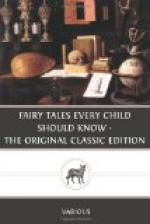There was once a very rich merchant, who had six children, three boys and three girls. As he was himself a man of great sense, he spared no expense for their education, but provided them with all sorts of masters for their improvement. The three daughters were all handsome, but particularly the youngest: indeed she was so very beautiful that in her childhood every one called her the Little Beauty, and being still the same when she was grown up, nobody called her by any other name, which made her sisters very jealous of her. This youngest daughter was not only more handsome than her sisters, but was also better tempered. The two eldest were vain of being rich, and spoke with pride to those they thought below them. They gave themselves a thousand airs, and would not visit other merchants’ daughters; nor would they indeed be seen with any but persons of quality. They went every day to balls, plays, and public walks, and always made game of their youngest sister for spending her time in reading, or other useful employments. As it was well known that these young ladies would have large fortunes, many great merchants wished to get them for wives; but the two eldest always answered that, for their parts, they had no thoughts of marrying any one below a duke, or an earl at least. Beauty had quite as many offers as her sisters, but she always answered with the greatest civility, that she was much obliged to her lovers, but would rather live some years longer with her father, as she thought herself too young to marry.
It happened that by some unlucky accident the merchant suddenly lost all his fortune, and had nothing left but a small cottage in the country. Upon this, he said to his daughters, while the tears ran down his cheeks all the time, “My children, we must now go and dwell in the cottage, and try to get a living by labour, for we have no other means of support.” The two eldest replied that, for their parts, they did not know how to work, and would not leave town; for they had lovers enough who would be glad to marry them, though they had no longer any fortune. But in this they were mistaken; for when the lovers heard what had happened, they said, “The girls were so proud and ill-tempered, that all we wanted was their fortune; we are not sorry at all to see their pride brought down. Let them give themselves airs to their cows and sheep.” But every body pitied poor Beauty, because she was so sweet-tempered and kind to all that knew her; and several gentlemen offered to marry her, though she had not a penny; but Beauty still refused, and said she could not think of leaving her poor father in this trouble and would go and help him in his labours in the country. At first Beauty could not help sometimes crying in secret for the hardships she was now obliged to suffer; but in a very short time she said to herself, “All the crying in the world will do me no good, so I will try to be happy without a fortune.”




